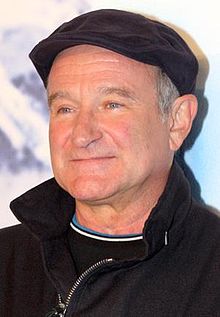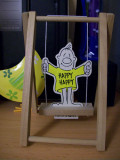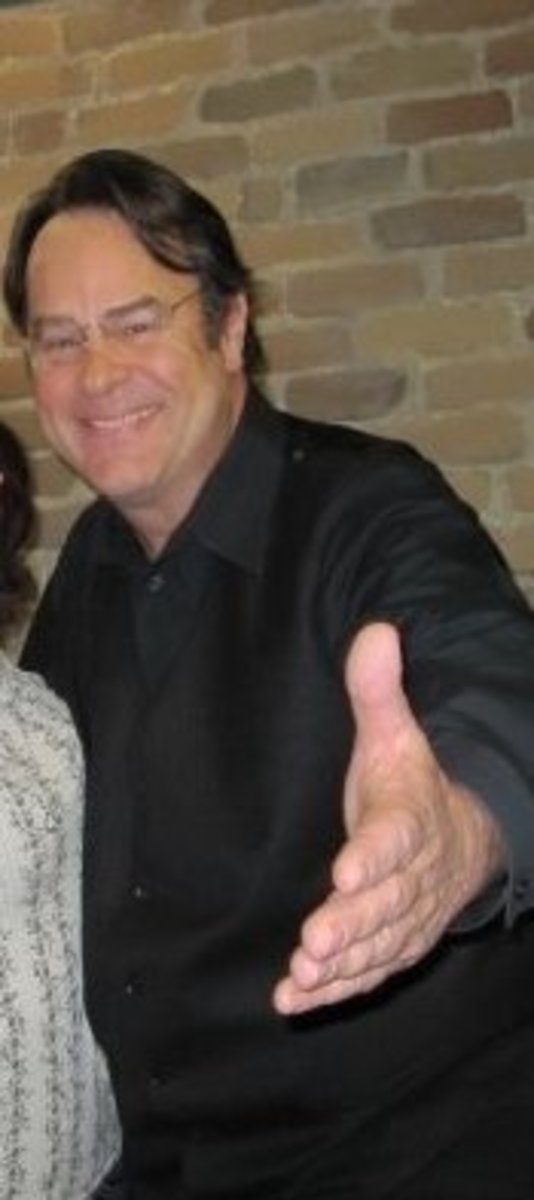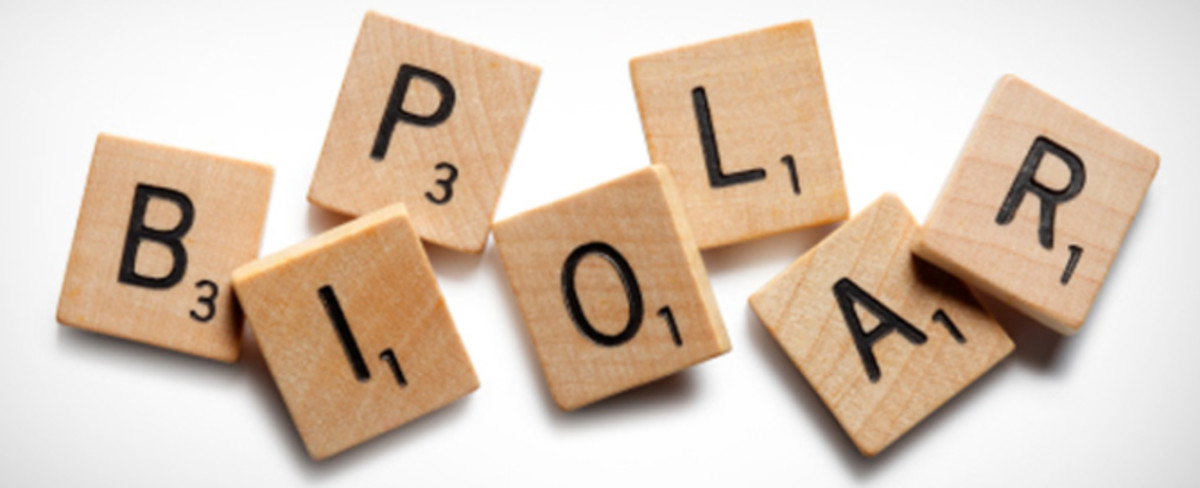Robin Williams' Comic Genius, Depression and Parkinson's Diagnosis: Were they the 'Perfect Storm' for Suicide?
From Standup Comedy, Robin Ventured into TV as an Alien
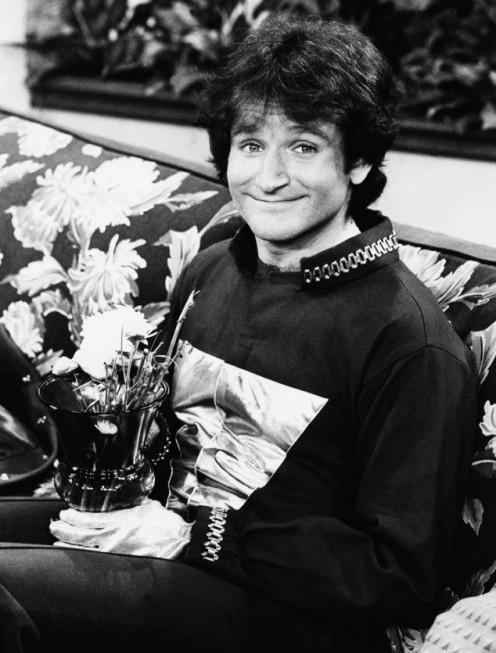
Depression Without Obvious Cause
The theory I’m about to advance in this article is entirely my own, and I hasten to add that I have no psychiatric, medical or other expert credentials to back it up. However, I do have personal experiences and powers of observation that led to my hypothesis. If you’re interested in my thoughts, read on….
~~~~~~~~~~~~~~~~~~~~
Robin Williams, whose suicide on August 11, 2014, shocked and saddened fans worldwide, was long suspected of suffering from either clinical depression or bipolar disorder. Both disorders lend themselves to ‘self-medicating’, often leading the sufferers into substance abuse, which only worsens their underlying problems and encumbers them with yet another major disorder to battle.
Clinical depression is characterized by persistent sadness and loss of interest in normal activities in the absence of external triggers, such as grief. An imbalance of neurotransmitters in the brain can cause an individual’s mood to plunge and lead to severe depression for no obvious reason, a mental state which may have a genetic component. Two of the signs of clinical depression may be a pervasive feeling of hopelessness and suicidal thoughts. Cognitive behavioral therapy in conjunction with anti-depressants may help a sufferer break free of depression by learning to change his or her thought patterns.
Unfortunately, deeply depressed individuals whose condition is long-term may become adept at hiding their feelings of distress and contemplation of self-destruction. Who, I ask, could be more successful at concealing such thoughts than a consummate actor such as Robin Williams?
Bipolar disorder is a mental illness (formerly labeled ‘manic-depressive’) that causes the sufferer to fluctuate between episodes of extreme energy, focus and productivity (mania) and severe, relentless depression. Types of the disorder range from mild to severe, with severe cases experiencing the broadest extremes of mania and depression.
These days, there are multiple medications that can be prescribed for the bipolar patient, but it’s often necessary to try several over a period of time to find one or more that will help an individual. Some people diagnosed with bipolar disorder say they can’t face being medicated every day, especially since their specific meds may hinder them from feeling like themselves. Some bipolar patients on medication that levels their moods actually miss the periods of mania, which may have felt euphoric to them. This can cause them to stop taking prescriptions that prevent or lessen mood swings, with the expected results.
Can you imagine anyone more likely to hate feeling ‘tamped down’ by medication than the man who became legendary for maniacally unleashing cascades of irrepressible free association upon an adoring public? He was frequently described as a ‘manic comedian’ or ‘the comic with a manic delivery.’ Would Robin Williams believe that loss of all manic impulses spelled disaster for his career?
Years of Performing for U.S. Soldiers

Struggles with Addiction
Robin’s struggles with addiction and mental illness are well documented in interviews during which he talked freely, and sometimes jokingly, about his addiction to cocaine (a stimulant) and alcohol (a depressant). He even hinted at the manic-depressive cycles of bipolar disorder to Terry Gross on the “Fresh Air” NPR radio show in 2006.
“Do I perform sometimes in a manic style? Yes,” he admitted. “Am I manic all the time? No. Do I get sad? Oh, yeah. Does it hit me hard? Oh, yeah.”
Yet, he never acknowledged a bipolar diagnosis or divulged anything about treatment. Whether or not he was truly bipolar remains speculative among friends and the public, but the signs were there. There is no doubt, however, that he suffered severe depression, and friends say in retrospect they’d witnessed it getting worse. Perhaps they'd observed him rebound from that deep, dark place in the past and expected him to do it again.
~~~~~~~~~~~~~~~~~~~~~~~~~~~
From the moment he burst on the scene in his inspired stand-up comedy routine (think back to HBO in the ‘70s if you’re old enough), the style of which was unique and mind-blowingly uproarious, followed by his popular stint on TV’s “Mork and Mindy”, Robin’s comedy genius was apparent. We had never before seen a performer such as he, and the magic was only beginning. He would go on to build an astounding body of work through nearly four decades.
His ability to improvise at lightning speed will likely never be equaled. Directors and co-stars of his movies and TV performances talk about his frequent launch into improvisational riffs on the set, including while the cameras were on him. His adlibs were often funnier than the script and, consequently, many were left in. Did you know that Robin improvised most of the radio rants he gave as the irreverent disk jockey in the movie, “Good Morning, Vietnam?” Yes, he was that gifted, and most of his directors were astute enough to give him improvisational carte blanche.
Wins Oscar for "Good Will Hunting"
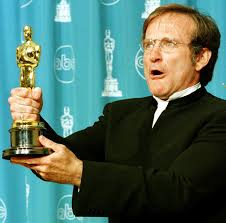
Who among his fans can forget watching him do standup comedy on TV as we nearly fell out of our chairs laughing? His rapid-fire delivery seemed to be pouring hysterical humor uncensored straight from his brain circuits?
When performing comedy he appeared to be rollicking in joyousness, as euphoric over the humor as his audience. This may have been true when his mood was one of elation, but I can’t help but wonder if that appearance may, at times, have concealed the melancholy against which he fought. It’s possible he only felt truly alive when performing—sharing his comedic gift with an audience and making others laugh. Who knows how long his comedy may have kept the demons of his depression at bay?
Even though his style of comedy delivery was unparalleled, Robin, who earned an Oscar for “Good Will Hunting” was equally gifted as a serious actor—lauded by both the critics and his peers for his dramatic roles. I was always keenly aware of the quality of his voice and phrasing when I watched one of his dramatic movies. He worked a different kind of magic with the nuances of that incredible resonant voice.
He had Fans Everywhere

Poignant Memories
There are tributes to him all over the world this week—on TV, in magazine articles and blogs, online videos, on social networks (Twitter is working overtime), and yesterday I read something Dick Cavett said in a TIME article (August 12, 2014).
“His death recalled a moment with him years ago in a small club. He came offstage after bringing a cheering audience to its feet. ‘Isn’t it funny how I can bring great happiness to all these people,’ he said, ‘but not to myself?’”
Cavett also remembered talking with Robin about how galling it was when people asked, “What do you have to be depressed about?”
~~~~~~~~~~~~~~~~~~~~~~~~~~~~
Jerry Leichtling is a screenwriter, playwright, lyricist, and political writer. He posted the column, “Robin Williams: The Secret Room” on Huffington Post’s ‘The Blog’ on August 15, 2014. His tribute to his long-time friend, Robin, is beautiful, and I urge you to read it in its entirety. The last line, in particular, is awesome. (You won't find it here--no spoilers.)
Leightling says of Williams, “He was the consummate gleaner—he would take in everything, swirl the data in his blender and pour out his wild mash-ups.”
Delving deeper into the comic’s seemingly inexhaustible comic inspiration during a serious conversation they once had, Leightling described him as ‘impossibly fast.’ Robin responded that the adlibs which seemed to be lightning in a bottle were often carefully selected from his vast mental Rolodex®. When you think about it, the ability to remember such an immense amount of material and instantly retrieve the perfect cache of one-liners from the mind’s depths validates this man’s genius. Yet their emergence always appeared like a frenetic burst of energy to his audience. His mind and his verbosity were always in sync.
Depression can Blind the Sufferer to Potential Solutions

The Depressed Mind Deceives
Suicide is a menacing choice that becomes feasible because of the lies depression tells its sufferers. When a person is tormented by severe and ongoing depression, as apparently Robin Williams was, the depressed brain insists, “You’d be better off dead. So would the people you’re hurting. You’re worthless. Your life will never get any better.”
It’s an insidious message that accumulates mental poison through repetition until, at the perfect time and lining up of events, it launches its strongest and most persuasive salvo.
Sufferers of ruthless depression may seek medical and psychiatric help, undergo cognitive therapy or even electro-convulsive therapy, take anti-depressants and other medications (such as those that treat the depression of bipolar disorder) and manage to fight off and overcome these dangerous thoughts.
Others, however, may eventually become so exhausted from constant emotional bombardment that they give in and listen to depression's falsehoods…believing the depressed mind’s dire predictions and losing hope. Depressed people are notoriously effective at hiding the seriousness of their condition from the people best placed and most likely to help them. This is why so many "survivors" of suicide (family and friends--even mental health practitioners) feel guilt because they couldn't recognize what was about to happen and prevent it.
~~~~~~~~~~~~~~~~~~~~~~~~~~~~
Some Medical Diagnoses Should be Given with Warnings about Depression

What Effect did the Parkinson's Diagnosis Have?
Since reading about his wife's announcement that Robin was recently diagnosed and coping with Parkinson's Disease, I believe the disheartening diagnosis plus experiencing whatever PD symptoms drove him to the doctor--coupled with his severe depression--must have been the proverbial last straw for Robin. It was difficult enough for him to fight for years against the weight of severe depression…to continue battling his dual demons of drug and alcohol addiction in order to stay sober. His recent return to rehab for a ‘booster shot’ may have been caused by the emotional trauma of a PD diagnosis that made it harder for him to maintain sobriety.
~~~~~~~~~~~~~~~~~~~~~~~~~~~
Here I digress into my personal observations about initial reactions (which may persist for months or longer) when one is diagnosed with an incurable and potentially progressive medical disorder. In my late forties, I began having involuntary muscle spasms that caused my eyes to close and squeeze shut against my conscious will. It took the greater part of a year for me to be accurately diagnosed and start on treatment. Then, the treatment took longer to actually work than expected before I could function normally…or nearly so.
During my first year with bilateral Blepharospasm (a neuromuscular movement disorder that’s a medical ‘cousin’ of Parkinson’s Disease), I was despondent, upset and experienced feelings of hopelessness. After my treatment took effect, I learned that suicide was not uncommon among people with this and other movement disorders if they did not respond to treatment. While I never contemplated ending my own life, I understood the misery and frustration of a body unresponsive to the commands of one’s mind. I’d experienced it. Throughout decades of treatment since then, on several occasions my condition has again been unresponsive to treatment. When that happens, I feel the initial misery and frustration all over again. But I know there is still hope for a better response next time.
~~~~~~~~~~~~~~~~~~~~~~~~~~~~~
Can you imagine how the expectation of increasing Parkinson’s symptoms—especially dyskenesia (uncontrolled movements), ‘brain fog’, unsteady gait,—any neurological aspect, for that matter, must have seemed to such a brilliant comic and actor who relied on the instantaneous virtuosity from his brain to create unmatched performances?
This disease, he surely realized, had the potential to hinder his ability for improvisation and spontaneity, normal movement and clarity of thought. It could change his ability significantly to perform in the style for which he was famous. He’d recently marked another birthday. At 63, the combination of depression and the prospect of progressive debilitation from Parkinson’s may have made him feel older than his years.
The potential destruction that might be wrought upon his mind and body might, I think, be unbearable for Robin Williams, already struggling under the ruthlessness of his depression. The knowledge that he might lose the ability to perform at his best must have weighed constantly on his mind until his terrors coalesced into the catalyst for tragedy on August 11. At that moment, I think he simply could not face it and did not share that feeling with anyone. If only he'd talked to Michael J. Fox, who is the most public face of PD and a friend of Robin's! MJ could have told him of his own early feelings about the disease and how he came to terms with it--even overcame obstacles and returned to acting. But Robin's wife says he wasn't yet ready to make his condition known.
Under this burden that must have seemed like the forces of a physical and mental storm converging on him, he made a decision that saddens everyone who loved him—even those of us who only felt as though we personally knew him from watching his performances, enjoying his interviews and reading articles about him that showcased his gentle, caring humanity. This past week I’ve read numerous comments by ordinary people—fans whose only contact with this talented man were viewing him onscreen and reading about him. Fans, like me, who shed tears upon learning of his death and shed still more when reading or hearing the outpouring of tributes to the shooting star brightening our sky who was the phenomenal Robin Williams.
With his passing, the brilliant light of Robin’s creativity was extinguished. Although there are still several movies that haven't been released, they will be the last from the pipeline.
But, oh! Aren’t we enormously privileged to have so much of his magic immortalized on video, on audio and in print? As long as we can laugh at “Mrs. Doubtfire”, feel revitalized by “Good Will Hunting” and “Dead Poets Society”, and relive the gifts he gave us—both comic and dramatic—through hundreds of hours of archived performances, Robin Williams’ amazing talent will live on for us and successive generations.
~~~~~~~~~~~~~~~~~~~~~~~~~~~~~
I watched a video tribute this week that incorporated brief clips of Robin in various roles with a voice-over of the actor delivering that incomparable graduation address from the movie, “Jack.” Its words are indelibly appropriate:
“In the end none of us have very long on this earth. Life is fleeting. And if you’re ever distressed, cast your eyes to the summer skies, when the stars are strung across the velvety night, and a shooting star streaks through the blackness turning night into day. Make a wish. Think of me. Make your life spectacular. I know I did.”
Godspeed, Robin.
~~~~~~~~~~~~~~~~~~~~~~~~~~~~~~~
If you know someone who shows signs of depression, even if he or she tries to hide it behind a smiling facade, please take a chance on being rebuffed and talk to your friend or loved one about the dangers of untreated depression. Be there to listen, and encourage that person to seek professional help. Depression--all types of depression--can be lessened or alleviated with appropriate treatment. The tragic death of Robin Williams is shining a spotlight on depression now, which may make it easier for sufferers to talk about this insidious and dangerous illness.
~~~~~~~~~~~~~~~~~~~~~~~~~~~~~~~~
Thanks for reading and supporting this HubPages writer!
---------------
Please join the discussion and leave comments. Your feedback is valuable to me as well as to other readers.
NOTE: I am the author of this article, and it is owned by me in entirety.It is not available for use by reproducing in any form without my express written permission. If you see all or any part of this article (as written) on another site, please notify me where it can be found. Theft of a writer's work is plagiarism, and stealing another person's words is no less unethical and illegal than any other theft.
---------------
In Memory of Robin Williams: 1951 - 2014
